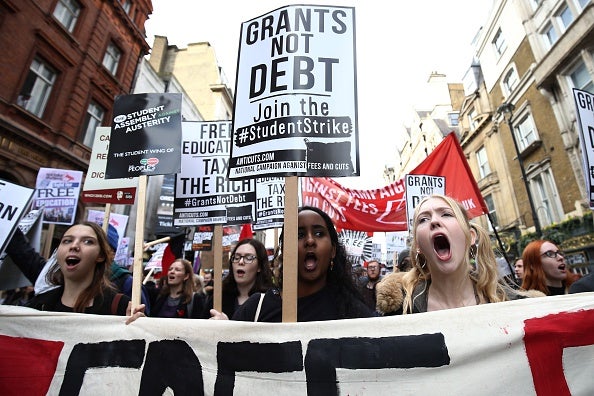Students should get involved in politics because, believe it or not, they can help shape Britain’s political landscape
'It may be too late to complain when you’re struggling so getting ahead, so forming even just a basic relationship with politics will serve you well for life'

Your support helps us to tell the story
From reproductive rights to climate change to Big Tech, The Independent is on the ground when the story is developing. Whether it's investigating the financials of Elon Musk's pro-Trump PAC or producing our latest documentary, 'The A Word', which shines a light on the American women fighting for reproductive rights, we know how important it is to parse out the facts from the messaging.
At such a critical moment in US history, we need reporters on the ground. Your donation allows us to keep sending journalists to speak to both sides of the story.
The Independent is trusted by Americans across the entire political spectrum. And unlike many other quality news outlets, we choose not to lock Americans out of our reporting and analysis with paywalls. We believe quality journalism should be available to everyone, paid for by those who can afford it.
Your support makes all the difference.We’ve heard it all before: the youth of today are not engaged or interested with politics, and who can blame them? With scenes of MPs in the Houses of Commons roaring with laughter in a feud that sounds like it has come straight out of the Eton playground, the distance between an ordinary student and the people in power can seem gigantic.
But students shouldn’t feel put-off politics because, ultimately, it will affect them throughout their lives. There is the comfort of being at university, and we can resist the title of ‘adult’ that little bit longer. Sadly, though, all good things must come to an end, and many students I have met at university choose to distance themselves from anything even remotely political.
It’s fairly easy to go through uni without engaging with politics but this arguably defeats one aim of going in the first place: to prepare for your future. Being a student is like being in a sort of limbo between a teenager at home having to go to school, and living independently and actually (or hopefully) being employed. There’s no doubt that many students dread the end of their final year.
The truth is, whether or not a housing bill is passed, or whether the Government is scrapping jobs in a certain sector, or any other decisions made in Parliament, these decisions will directly affect graduates who are trying to make a living.
As part of growing up, everyone should start speaking up for what they believe in - and university is a great place to start. There are endless opportunities to get involved and get your opinions out there, such as question-and-answer sessions for the students’ union elections, or public debates on national issues. You don’t need to be an aspiring MP or politics student to attend - and you could leave having learnt a lot.
Events, such as the recent i paper's iDebate in Leeds, bring students closer to leading political figures and are a perfect opportunity to initiate an excitement for politics among young people. The most recent iDebate discussed the motion ‘British politics does nothing for young people’ and saw a host of leading political figures battle-it-out in an evening of healthy, and dare I say enjoyable, debate.
During the event, there was serious encouragement for young people to get involved in politics. One of the politicians on the panel, 24-year-old SNP MP Stuart Donaldson, said: “If you’re good enough, you’re old enough, so get involved.” There’s no denying the current political landscape fails to captivate every single young person, but if students attended events like these - and took an active role in reading, listening, or taking part in politics - they will be able to make a difference.
The fact that the young audience voted against the motion at the end of the debate demonstrates how such events can narrow the gap between the ordinary student and the people in power. I implore all students, at some point in your student life, to go to an event, debate or protest, and I can guarantee it will get you thinking about politics. Whether you agree or disagree, you’re a step closer to getting your voice heard.
In terms of protesting, the modern student activist has a wealth of resources. Social media has enabled students or organise protests in a much easier way. It takes a matter of minutes to find out what protests are about, and taking part in them can help them be heard.
Online petitions have become the latest way to express agreement, or the opposite, regarding an issue. On websites such as Change.org, anyone can make a petition, and if they gather enough signatures, they get free publicity. Furthermore, there are government petitions that, if they acquire enough signatures, must be debated in Parliament, another opportunity for students to communicate with politicians.
The decisions made by those in power while student are at university are more than likely to be in full effect by the time he or she graduates. It may be too late to complain when you’re struggling so getting ahead, so forming even just a basic relationship with politics will serve you well for life.
Join our commenting forum
Join thought-provoking conversations, follow other Independent readers and see their replies
0Comments